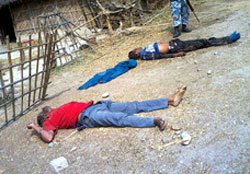While the seven-party government focuses on delicate negotiations with the Maoists, sections of the tarai, where 48.4 percent of the nation's population lives, are descending into turmoil.
Vigilantism and anti-Maoist activity are turning into sometimes violent ethnically-laced evictions and abductions. Separatist sentiments are getting populist play, while among the intellectual moderate majority there are debates on how the tarai could be best represented in restructuring.
Maoists, ex-Maoists, separatists and moderates all see a Nepal polarised between hill and plain. For many Madhesis, anger from long-felt discrimination fuelled by radicalised identity politics is boiling over.
Over the past year, Jaya Krishna Goit's Tarai Janatantrik Mukti Morcha (TJMM), which has been battling Maoists since late 2004, has also been hounding the Pahadiya community, mainly in the central-eastern tarai but also in adjoining areas. Families are rushing to sell off houses and land, and migrate to the hills.
"This trend has picked up recently, many of my friends from Rajbiraj have settled in Kathmandu," confirms former NC minister Jay Prakash Gupta \'Anand\' who is now general secretary of the Madhesee Janaadhikar Forum (MJM).
A recent UN situation report also states that the situation in some tarai districts was 'rather volatile.especially in early June'. It said the TJMM issued threats against hill ethnic groups settled in the tarai asking them to go back to their villages.
Much of the unrest stems from a rift in the Madhesi movement, between ex-Maoists Goit and his arch-rival, Maoist leader Matrika Prasad Yadav.
The issues themselves go deeper, including identity politics and a sense of discrimination felt by the Madhesis. All of this is fanning radicalism in Nepal's resource-rich breadbasket.
Slow burn in the tarai
 A volatile cocktail of separatism, discrimination and citizenship fuels a split in tarai Maoists
A volatile cocktail of separatism, discrimination and citizenship fuels a split in tarai Maoists
A lifelong communist, Jaya Krishna Goit joined the UML after 1990 but was lured into the Maoist fold by Matrika Prasad Yadav.
But the two fell out and in 2004, when Yadav replaced him as chairman, Goit set up the Tarai Janatantrik Mukti Morcha (TJMM).
The TJMM's stated aim is to fight the Maoists for control of the Madhesi agenda. More worryingly, it is aiming to split the tarai plains from the rest of Nepal. It has an estimated 150-200 fighters but is active from Saptari to Rautahat districts through its ally, the Tarai Tigers. The tactics it uses are brutal, many would argue, terrorist-like.
Earlier this month, the TJMM abducted two Nepal Telecom engineers for ransom. This month it captured two employees of the small border customs in Saptari. All were of hill origin and were later released, but it's not clear whether ransom was paid.
Goit's group has threatened hill origin people to vacate the tarai or face "action". Several Pahadiya-owned industries have been forcibly closed and their owners forced to flee. Large farms owned by Pahadiya jamindaars have been confiscated.
Madhesi intellectuals and leaders in Kathmandu deplore the TJMM's tactics. "There is no support in the Madhesi community for an independent Madhes, we all want to remain a part of Nepal," asserts Vijay Kant Karna, a lecturer of political science and chairperson of Jaghrit Nepal, "but I can't say what will happen if Madhesis do not get due recognition in the state restructuring."
People who have known Goit say the TJMM leader was radicalised after falling out with the Maoists over his replacement by Yadav in the Maoists' Tarai Mukti Morcha, apparent discrimination against Madhesis even within the Maoist hierarchy and the division of Madhes by the Maoists into the 'Madhes Autonomous Region' and the 'Tharuwan Autonomous Region'.
"Goit was dissatisfied by the discrimination within the Maoists' own ranks, very few Madhesis got leadership roles in the party's organisational structure in the Madhes. Almost all were sent from the hills," says Karna. Yadav agrees there was plenty of discrimination. He told us in an interview (see box): "I myself resigned from all major positions in the party to show my dissatisfaction." Yadav says the grievances have been addressed, particularly after the Maoists' Chunwang plenum in late 2004. But this was too late for Goit. Having lost his leadership position and disagreeing with the Maoists' division of the Madhes into two regions, he split and set up the TJMM.
The division of Madhes is a potent issue. The Maoists have not just split off Tharuwan from the Madhes, but have also floated a concept of further divvying up the Madhes into five different regions. Many Madhesi intellectuals and leaders see this as as an attempt to diffuse the Madhes's power. "Nepal's ruling elites have forever been suspicious of the Madhes because they think these people are of Indian origin, and therefore pro-Indian," explains Gupta, "that is not true. We Madhesis are as much Nepali and pro-Nepal as anyone else."
Even Maoist leader Yadav hesitates about accepting this division. "I am in favour of a unified Madhes," he says haltingly, "but I also believe there can be separate regions within a unified Madhes."
Mixed up in all this is the issue of citizenship for two-four million people in the tarai who don't have it, the main plank of the Nepal Sadbhabana Party (NSP). In the seven-party government it appears to be a way to buy time and make concessions-the NC and UML have set a deadline to resolve the issue.
For Gupta of MJM, citizenship is not the topmost agenda in the Madhesi mind. He says: "The main issue is discrimination, and how that might be resolved through a federal state structure with real autonomy." Gupta has written a book titled Rebellion against Tamil Discrimination in Sri Lanka which he says is about how problems like Sri Lanka arise if ethnic discrimination is ignored by the state.
RELATED ARTICLE
Interview
"A unified Madhes"
Matrika Parsad Yadav, Maoist Central Committee member, Chairman of the Tarai Mukti Morcha, Chairman of the Tarai Autonomous Region
Comment at Suman\'s Blog


